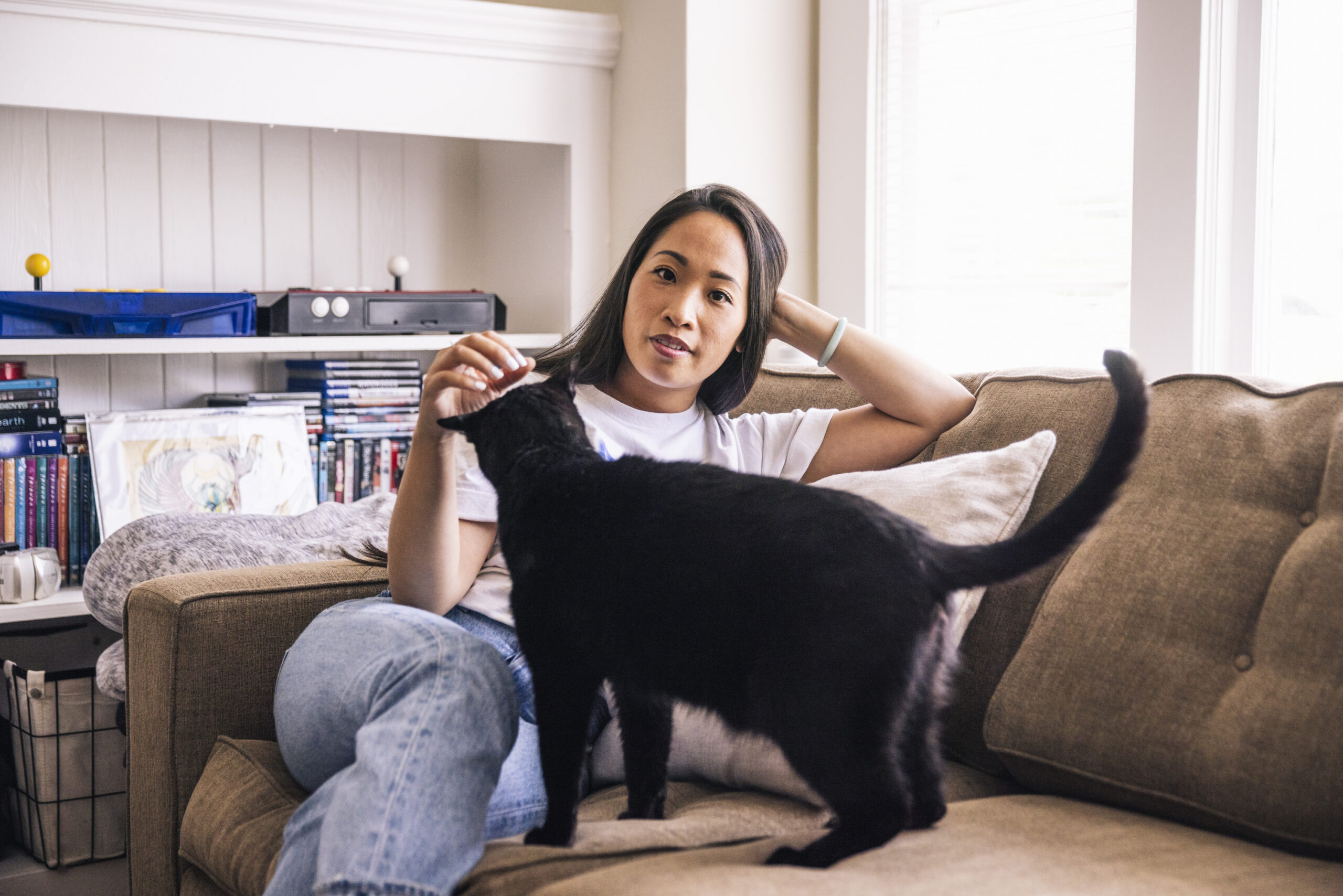
In Hoiping, a city in the Guangdong province of southern China, the dominant language isn’t Mandarin or Cantonese. It’s Toisan, a regional dialect that isn’t commonly spoken elsewhere. In California, it’s rare to find anyone who understands it, even among Chinese immigrants.
But for Amy Guan, a first-generation San Franciscan whose parents emigrated from Hoiping in 1986, it’s all she knows.Now, nearly 7,000 miles away from her parents’ homeland, Guan, 32, is restitching her family’s origin story into a newfound career as a bagmaker for her independent label,Modokot.
“ ‘Modokot’ is slang in our native tongue. It means ‘nothing goes to waste,’ ” Guan said. “If we had rice left over in our dinner bowls, my grandma would always yell “Modokot!” She used this phrase for everything, so we heard it often growing up.”
The idea for her business grew from a visit to her parents’ hometown in Hoiping, where she discovered her mother’s sewing machine. Guan decided she would recast her family’s history with fabrics by creating a design venture that operated on sustainability, savvy and quality — driven by the “do not waste” spirit she was instilled with.
After seven years in the corporate tech world helping immigrant employees obtain work visas, Guan left a more lucrative position at Facebook in 2021 to launch her fledgling business.

At Modokot, she’s a one-woman assembly line, designing and creating fashionable sling bags by hand in her Sunnyside apartment using a factory-grade sewing machine and techniques she picked up from her mother, Julie Guan, who worked as a seamstress in both China and the U.S.
Amy’s work is an ode to the legacy of resourceful women in her life, all of whom worked as seamstresses and caretakers while living in Sunnyside, Mission Terrace, and Excelsior — at times with up to 15 others in a single household. During those years,Julie Guan would often bring home fabrics to sew, exposing Amy and her two sisters to an extraordinary work ethic and basic design principles.
In 1995, Amy’s mother was hired by Levi Strauss, quickly rising to production supervisor. She worked there until 2002, when the company closed its San Francisco factory and began to outsource labor overseas to foreign countries, including China.
Julie Guan continued to sew until she eventually retired, but she hoped her daughter would capitalize on her education and find a high-salary job that didn’t depend on the type of rigorous physical labor she endured. It was a shock when she learned her daughter was leaving Facebook to take up sewing.
“Sewing is difficult to earn a living from,” Julie Guan told The Chronicle in Toisan through an interpreter. “Whatever you make is needle by needle. I encouraged Amy to keep her full-time office job and do it part time only.”

But Amy Guan was undeterred. Over the past year, she has applied the same type of focus and self-determination her mother once did to master the art of the needle. The COVID pandemic provided time to establish a work space in her living room and experiment with designs.
“Modokot, at its core, is the cumulation of my family and community,” said Guan. “I have carried this mentality in so many parts of my life. Not wasting my passion and talents, using all the scraps I have to make meaningful pieces for others, purchasing deadstock fabrics to minimize my footprint in the textile industry. My hope for this brand is to be a reminder for others to not let things or ideas go to waste.”
平衡功能和美学,关女士的包s incorporate utilitarian minimalism with bright hints of color and worldly touches. She mixes non-traditional, rare and specialized fabrics ranging from Mexican serapes to sunbrella, ripstop, corduroy andDyneema composite, a lightweight sail material developed for open-water racing.
After much trial and error, Guan can complete an average bag in under three hours.
Guan’s work can be found at local events andfestivals like 415 Day, where Guan was selling her slings next to a live stage whereHunters Point rap pioneers RBL Posseperformed. She also collaborates with other small-business owners, like Dominick Morales ofPamana Plantas, a Filipina-owned plant nursery on Solano Avenue in Berkeley.
“Amy is absolutely wonderful to work with,” said Morales. “Her energy hypes me up, and when it comes to design and creativity, it feels like we’re on the same page.” This summer, Guan is teaming up with Morales for theone-year anniversary celebration of Pamana Plantason June 18.

As her skills have grown, Guan has been able to teach her mother what she has learned. Together, they have gone fabric shopping and customized a bag to her mom’s liking.
“I learn from Amy now,” Julie Guan said. “I was a factory worker, not a designer. But Amy is a designer. It’s exciting. (She’s) doing an even better job than me.”
The daughter has introduced her mother to textiles more exotic than the denim and cotton she worked with at Levi’s, and to her younger generation’s way of thinking. Still, after making a bag together, Julie Guan couldn’t completely forget her traditional background.
“After we made the bag, (my mom) put an old Levi’s label on it,” Amy said with a laugh. “There’s a lot of beauty in her work, but she’s used to being an invisible maker in the production line. Personally, I refuse to be overlooked or silenced. I want to show her that it’s still possible to do what you love and enjoy it.”
Grow Off Market:10 a.m.-3 p.m. Sunday, June 12. Free. 400 Contra Costa St., Vallejo.
Pamana Plantas’ One-Year Anniversary Fiesta:Noon-5 p.m. Saturday, June 18. Free.1615B Solano Ave., Berkeley.
Follow Modokot online atwww.instagram.com/modokotfor more updates and custom orders.
